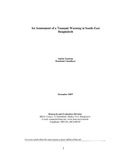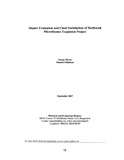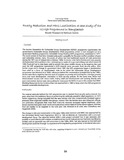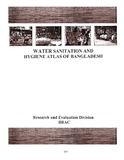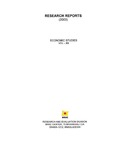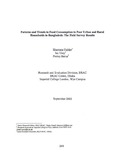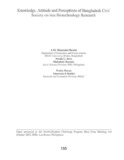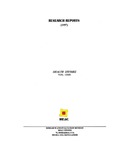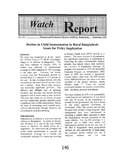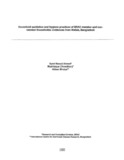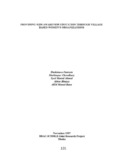BRAC Research and Evaluation Division (RED) Archive
Browse by
Research at BRAC – BRAC University
The development interventions and programs of BRAC are powered by research from three institutions of BRAC University:
- BRAC Institute of Educational Development (BRAC IED) is an educational institute that pioneers in the holistic development of education, working in areas such as early childhood development, play-based learning methods, psychosocial wellbeing of stakeholders, primary and secondary education, and curriculum and textbook design. BRAC IED focuses on implementing high-impact and scalable models and advocating for evidence-based best practices.
- BRAC Institute of Governance and Development (BIGD) is a social research institute that focuses on improving development and governance outcomes. With a strong background in ethnographic, participatory, and mixed-method research, BIGD has extensive experience in four thematic areas: (1) economic development and growth, (2) governance and politics, (3) gender and social transformation, and (4) urban, climate change, and environment.
- BRAC James P Grant School of Public Health (JPGSPH) is a research institute that aims to address unmet public health challenges by applying an integrated interdisciplinary approach consisting of Education, Training, Research and Advocacy. Multidisciplinary in approach and method, research at JPGSPH involves investigating critical and emerging health needs in developing countries to identify evidence-based solutions.
BRAC has a storied tradition of applying the rigours of research in designing development interventions, monitoring progress, documenting achievements, and undertaking impact assessments. The Research and Evaluation Division (RED) was established as a multidisciplinary independent research unit in 1975. In 2018, RED was absorbed into the institutes. Adopting a praxis-oriented approach, these institutions aim to transform knowledge into action-oriented research that contributes to the global knowledge stream.
Sub-communities within this community
-
Economic Studies [151]
-
Health Studies [231]
-
Social Studies [191]
Collections in this community
-
Annual Report [13]
Recent Submissions
-
An assessment of a Tsunami warning in South -East Bangladesh
(BRAC Research and Evaluation Division (RED), 2007-12)This research aims to look at household responses to a tsunami warning that took place in south-east coastal areas of Bangladesh on 12 September 2007. The study was conducted in both the mainland and islands of Coxs Bazar ... -
Impact evaluation and client satisfaction of Northwest Microfinance Expansion Project
(BRAC Research and Evaluation Division (RED), 2007-09)Bangladesh is known for its microfinance outreach. However. the density of microfinance is not evenly distributed. The poorer region, specially the northwestern part of Bangladesh has long been underserved by the ... -
Poverty reduction and MDG localization: a case study of the IGVGD Programme in Bangladesh
(BRAC Research and Evaluation Division (RED), 2007) -
Water sanitation and hygiene atlas of Bangladesh
(BRAC Research and Evaluation Division (RED), 2007-12) -
Patterns and trends in food consumption in poor urban and rural households in Bangladesh: cluster analysis of household survey data
(BRAC Research and Evaluation Division (RED), 2003-09)Objectives: To identify groups within rural and urban Bangladesh demonstrating similar socio-economic characteristics and food consumption patterns. Design: A household survey was conducted in a variety of locations m ... -
Patterns and trends in food consumption in poor urban and rural households in Bangladesh: major food sector studies
(BRAC Research and Evaluation Division (RED), 2003-09)This paper examines six major food sectors in Bangladesh namely rice, wheat, fishery, poultry, dairy, and fruits and vegetables, concentrating on production and consumption changes with evidence from the BRAC/Imperial ... -
Changing food consumption patterns: implications for nutrition and livelihoods
(BRAC Research and Evaluation Division (RED), 2003-09)This report presents a review results on the trends and patterns in food intake and nutritional status of the poor rural and urban households of Bangladesh during the period 1991-2000. It then looks at the socio-economic ... -
Process documentation of selecting the ultra poor for CFPR/TUP Programme
(BRAC Research and Evaluation Division (RED), 2003-07)ll1e targeting process for the CFPR/TUP programme aims to bring together diverse strands of knowledge on poverty (indigenous, local, programmatic and academic) in identifying and selecting CFPR/TUP beneficiaries (tvfatin ... -
Cause and effect analysis membership discontinuation: a case study
(BRAC Research and Evaluation Division (RED), 2003-08)Research and evaluation division of BRAC initiated the case study to look into the dropout matter for in-depth understanding of the causes and effect and policy implication of the issue. Two BDP area offices, one from ... -
Poverty outreach and BRAC’s microfinance interventions programme impact and sustainability
(BRAC Research and Evaluation Division (RED), 2003)This paper is based on the experience and evolution of a large microfinance provider BRAC - which is working in Bangladesh. The paper stresses that poverty is not homogeneous, but is manifested in different ways and in ... -
Patterns and trends in food consumption in poor urban and rural households in Bangladesh: the field survey results
(BRAC Research and Evaluation Division (RED), 2003-09) -
Knowledge, attitude and perceptions of Bangladesh civil society on rice biotechnology research
(BRAC Research and Evaluation Division (RED), 2003-10) -
Muktagacha: a targeted nutrition project in Bangladesh
(BRAC Research and Evaluation Division (RED), 1997-12)Malnutrition is one of the major public health problems in Bangladesh. Since 1993, BRAC, a national non-governmental organisation (NGO), has been carrying out a targeted nutrition project in a thana (sub-district) of ... -
Medical waste disposal at BRAC Health Centres : an environmental study
(BRAC Research and Evaluation Division (RED), 1997-06)The study was conducted to determine the awareness level of BRAC's Health Centre staff on disposal and handling of medical wastes, and to recommend improved methods to handle and dispose of medical waste in order to ... -
Decline in child immunization in rural Bangladesh: issues for policy implication
(BRAC Research and Evaluation Division (RED), 1997-09)The study was conducted on all the under two children living in 70 BRAC surveillance villages in 10 districts of Bangladesh. The data were collected in October 1996. A decline was observed in immunisation coverage in 1996 ... -
National Immunization Day (NID) campaign in Bangladesh: are the participation and coverage increasing?
(BRAC Research and Evaluation Division (RED), 1997-12) -
Report on the first seasonal round survey: household health economy (BRAC-ICDDR,B joint research project)
(BRAC Research and Evaluation Division (RED), 1996-03) -
Morbidity prevalence and health care-seeking behavior of BRAC member and non-member households households: evidences from Matlab. Bangladesh
(BRAC Research and Evaluation Division (RED), 1997)Understanding the morbidity profile-and health care seeking behaviour of socioeconomic strata of the community is important for planning and delivery of appropriate health services, especially for the poor. This paper ... -
Household sanitation and hygiene practices of BRAC member and non-member households: evidences from Matlab, Bangladesh
(BRAC Research and Evaluation Division (RED), 1997)Provision of potable water and sanitation facilities for the vast majority of the poverty-stricken people of developing countries remains a formidable challenge for sustainable development To accomplish this task, policy ... -
Providing AIDS awareness education through village based women’s organization
(BRAC Research and Evaluation Division (RED), 1997-11)Objectives: This study aimed to assess the effectiveness of a basic AIDS education module delivered through grassroot NGO network in rural Matlab, Bangladesh. It also explored the level of dissemination of knowledge gained ...

